
The aplomado falcon is a medium-sized falcon of the Americas. The species' largest continuous range is in South America, but not in the deep interior Amazon Basin. It was long known as Falco fusco-coerulescens or Falco fuscocaerulescens, but these names are now believed to refer to the bat falcon. Its resemblance in shape to the hobbies accounts for its old name orange-chested hobby. Aplomado is an unusual Spanish word for "lead-colored", referring to the blue-grey areas of the plumage – an approximate English translation would be "plumbeous falcon". Spanish names for the species include halcón aplomado and halcón fajado ; in Brazil it is known as falcão-de-coleira.
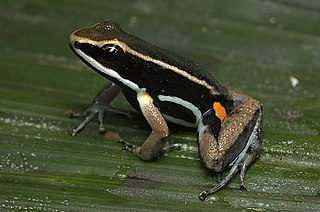
Allobates femoralis is a species of frog in the family Aromobatidae. It is found in Bolivia, Brazil, Colombia, Ecuador, French Guiana, Guyana, Peru, and Suriname. Its natural habitat is tropical lowland forests.
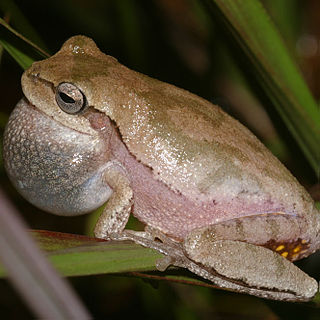
The pine woods tree frog is a species of frog in the family Hylidae, endemic to the southeastern United States.
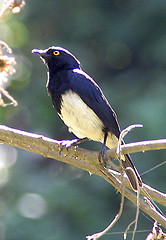
Abbott's starling is a species of starling in the family Sturnidae. It is found in Kenya and Tanzania. Its natural habitat is subtropical or tropical moist montane forests. It is threatened by habitat loss, and its population is estimated at 2500–9999. This species, at 16 to 18 cm long, is the smallest species of starling. It is in the monotypic genus Arizelopsar.

Ptinus is a genus of beetles distributed throughout much of the world, including Africa, the Australian region, the Palearctic, the Near East, the Nearctic, and the Neotropical realm. It is a member of the subfamily Ptininae, the spider beetles.

Pipiza is a genus Hoverflies, from the family Syrphidae, in the order Diptera. Most are dark hoverflies.

Pipizini is a tribe of small to medium-sized generally black hoverflies, although some species also have orange spots on their abdomen. This nondescript colouring can lead to some species being confused with other dark hoverflies from other tribes. The lack of a facial knob is a good defining feature which separates them from most of these other hoverflies. As with other species in the subfamily Syrphinae the larvae feed on aphids though there seems to be a preference for wax-secreting aphids e.g. Pemphigidae.

Pipiza noctiluca is a species of Hoverfly, from the family Syrphidae, in the order Diptera.
Pipiza fenestrata is a species of hoverfly, from the family Syrphidae, in the order Diptera. They are found in Central Europe and live in deciduous forests. This species of Pipiza tends to live deeper in the forest than others in this genus. Males of this species possess holoptic vision, while females have dichoptic vision.

Pipiza luteitarsis is a species of Hoverfly, from the family Syrphidae, in the order Diptera.
Lonchodes femoralis, is a species of phasmid or stick insect found in Sri Lanka.

Scymnus is a genus of beetle in the family Coccinellidae. It is the type genus of the subfamily Scymninae and the tribe Scymnini.
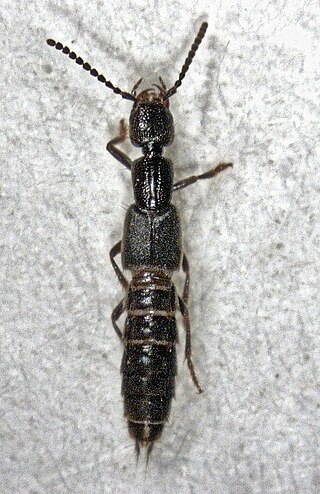
Cafius is a genus of relatively large rove beetles in the family Staphylinidae. There are about 8 described species in Cafius found in North America, and approaching 50 globally.

Tropiduchidae is a family of planthoppers in the order Hemiptera. There are at least 160 genera and 600 described species in Tropiduchidae.

Peritrechus is a genus of dirt-colored seed bugs in the family Rhyparochromidae. There are at least 20 described species in Peritrechus.
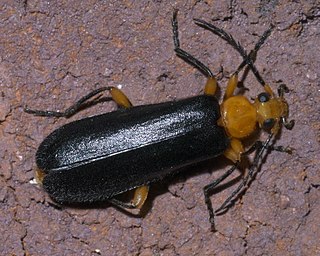
Neopyrochroa femoralis is a species of fire-colored beetle in the family Pyrochroidae.
Pipiza puella, the sumac gall pithead, is a species of syrphid fly observed in eastern and Central United States, Canada and Norway. Hoverflies can remain nearly motionless in flight. The adults are also known as flower flies for they are commonly found on flowers from which they get both energy-giving nectar and protein rich pollen. Larvae when known are aphid predators.
Total of 245 species either found or highly expected to be found in New York.












